- Home
- Carolyn Keene
A Secret in Time
A Secret in Time Read online
Contents
* * *
1 Time for Trouble
2 The Old Clock Strikes Again
3 A Very Healthy Suspect
4 Round-the-Clock Protection
5 In the Cat Burglar’s Lair
6 Over the Edge
7 A Valuable Discovery
8 Break-in!
9 Midnight Getaway
10 A Moving Story
11 Playing Cat and Mouse
12 An Answer Too Late
13 Time Runs Out
14 Deep Freeze
15 A Warm Reunion
1
Time for Trouble
“It’s funny that we’re making a special trip just to see your clock,” Bess Marvin said to her friend Nancy Drew. “I mean, we can see it any time sitting on your dresser.”
Nancy smiled as she turned her blue convertible sports car into the teachers’ parking lot at River Heights High School. “You know what else is weird?” Nancy asked. “Parking in the teachers’ lot. It wasn’t that long ago that we were seniors here.”
“We would have been towed away in two seconds back then,” Bess said. “Kind of feels like we’re getting away with something.”
Through her dark glasses, Nancy’s deep blue eyes surveyed the lines of parked cars in the lot. “Looks like everyone in town showed up for the antiques expo. We’ll be lucky to get a space. Wait, I see one. This is going to be tight. . . .” She expertly maneuvered her sports car into a narrow parking space, and the two girls got out.
“Whew! It’s hot.” Bess squinted into the summer sunlight as she and Nancy hurried across the asphalt toward a side entrance to the building.
Shorter and with a slightly rounder build than Nancy, Bess had to hurry to keep up. Grabbing an elastic band from the outside pocket of her purse, Bess twisted her straight blond hair into a makeshift bun to get it off her neck. Nancy’s reddish blond hair was already pulled back in a neat French braid. She was wearing white shorts and a navy T-shirt.
The girls entered the high school and made their way down the cool, dim hall toward the gymnasium, where the antiques expo was being held. Half a dozen other people were heading in the same direction.
“By the way,” said Bess, smoothing her blue cotton sundress, “don’t get me wrong about the clock. I think it’s great that Mr. Gordon wants to feature it in his exhibit. You’re not going to let him sell it, are you?”
Nancy’s eyes widened. “Of course not! That’s a memento of my very first case. It means more to me than anything else I own.”
Though Nancy was only eighteen years old, she was already an experienced detective. With the help of Bess and Bess’s cousin, George Fayne, Nancy had solved many baffling cases in River Heights and all over the world. In her first case, Nancy had helped some poor families collect large sums of money they had inherited. She had discovered a tiny notebook and key hidden inside an old clock, and those clues led her to a secret will that left the savings of a rich old man, Josiah Crowley, to his poor relatives. In gratitude, the heirs had given the clock to Nancy as a keepsake.
After keeping perfect time for quite a while, the clock had begun to run slow. Nancy had taken it to a local antique-store owner, Henry Gordon, who was also an expert at clock repair. Mr. Gordon told Nancy he had never seen a clock quite like it, and he asked her where she’d gotten it. When Nancy told him the story, he was so impressed that he asked her permission to exhibit the clock at the antiques expo. Then Mr. Gordon had invited Nancy to come to the show to see it on display.
“Looks as if this is a pretty popular event,” said Bess, as she and Nancy approached the gymnasium. “Reminds me of all those high-school dances.”
A large crowd was milling about outside the entrance. In front of the doors, men and women at long tables were collecting admission fees.
When Nancy and Bess reached one of the tables, a pudgy woman pushed a lined piece of paper toward them. “Please give us your name and address,” she said. “We’d like to put you on our mailing list for future expos.”
After they’d paid and signed in, the girls entered the gym.
“Wow!” Bess exclaimed, pausing just inside the doors. “Look at this place.”
Nancy followed her friend’s gaze. The gym had been completely transformed. The bleachers were still set up against one wall, but the rest of the huge, open room was filled with row after row of exhibits. Some were long tables covered with jewelry, glassware, and small household objects. There were also stands displaying all kinds of artwork and clothing from earlier eras. Some of the exhibits were much larger, featuring groupings of furniture and, in one case, an antique car.
“It’s hard to believe this is the same place where we used to dribble basketballs and do jumping jacks,” Nancy observed.
“Ugh. Don’t remind me,” Bess said with a shiver. “I like it much better this way.”
Nancy laughed. Athletics had never been one of Bess’s favorite activities. Nancy knew her friend would rather shop than do push-ups any day.
“We’ll never find Mr. Gordon,” Bess said, a frown creasing her brow.
“Sure we will.” Nancy grabbed a map from a pile right inside the door and scanned it. “Here’s Mr. Gordon’s exhibit,” she announced. “Past Perfect is the name of his store. He’s at booth six.”
They were halfway down the second row when Bess pulled Nancy toward a glass display case. “Do you mind if we just look for a minute?” she asked. “I’d like to check out the jewelry.”
“Take your time,” Nancy said. “I’m not in any hurry.”
As she followed Bess over to a jewelry display, Nancy had to sidestep a tall, slender woman dressed dramatically in a black minidress and a small black hat. A gauzy white scarf was looped around her neck, and she wore dark glasses, even though she was indoors. Nancy glanced curiously at the woman. There was something oddly familiar about her. But before she could figure out where she’d seen her before, Bess was pulling her over to the display case.
“Oh, look at this stuff!” Bess exclaimed, her blue eyes gleaming.
Inside the case, sparkling antique watches, rings, bracelets, and brooches were lined up in orderly rows on a piece of black velvet. “It’s a good thing I didn’t bring my credit card,” Bess went on, pointing at a white gold ring with a cluster of tiny pearls. “That’s gorgeous. I wonder how much it costs.”
A thin man behind the counter peered at Bess over large horn-rimmed glasses that sat low on his nose. He was in his mid-thirties and wore his light brown hair cut short. “It’s very expensive,” he said. “Very expensive.”
Nancy was surprised at the man’s tone. A comment such as that would turn away more business than it would attract, she thought. Of course, she and Bess weren’t seriously planning to buy the ring, but the man didn’t know that. Nancy glanced at the sign in front of the man’s exhibit. It read Russell Brown Antiques.
“Mr. Brown?” Nancy asked the man, raising her eyebrows.
When he nodded, Nancy asked, “How old is this pearl ring? It’s so pretty.”
“It’s a rare piece from the turn of the century. There aren’t many like it.” Mr. Brown took a pair of amethyst earrings out of a case to show a customer, and Bess and Nancy looked at some of the other pieces of jewelry.
“I didn’t even want to hear how much that ring cost,” Bess said under her breath.
“You probably would have fainted right on the spot if he had told you,” Nancy replied, and both girls laughed.
Nancy glanced at the other customers at Mr. Brown’s booth—a handful of women and a big man with an orange T-shirt stretched over his fat stomach. “I wonder what these people think of Mr. Brown’s prices,” she whispered to Bess.
Bess put back the necklace
of semiprecious stones she’d been admiring. “They seem way out of line to me.”
Nancy spotted Henry Gordon across the aisle and pointed him out to Bess. Even in the crush of people, Mr. Gordon stood out. While everyone else was dressed in casual summer clothing, Mr. Gordon looked as if he’d stepped out of an English novel. He was wearing an old suit with a matching vest and tiny round eyeglasses with metal frames. His gray hair was combed back, and Nancy could see the gold chain of a pocket watch tucked in his vest. Gordon noticed Nancy and Bess and waved them over to his booth.
“It’s a madhouse!” he shouted as the girls pushed through the crowd toward him.
“I guess we’re not the only ones with a passion for the past,” Nancy said, grinning. “Mr. Gordon, this is my friend Bess Marvin.”
“Very pleased to meet you,” Mr. Gordon said, shaking Bess’s hand.
“I know your assistant, Lydia Newkirk,” Bess volunteered. “She grew up down the street from me. I haven’t seen her since she went away to college a few years ago. I heard she was back, though, and working for you.”
“A singular young woman,” Mr. Gordon said, smiling fondly. “And a great help to me.”
“Is Lydia here today?” Bess asked. “I’d love to say hello.”
Mr. Gordon nodded and gestured vaguely at the crowd. “Somewhere. She’s been working hard all morning, so I gave her some time to shop.”
“I’ll bet she’s looking for costumes,” Bess said. She turned to Nancy. “You remember Lydia, don’t you? She’s the one who liked to dress up in outfits from different times.”
“Oh, yes,” Nancy said after thinking a moment. “I remember seeing her once wearing long white gloves and carrying a parasol.”
Bess giggled. “That’s Lydia, all right.”
“She’s been a big help to my business,” Mr. Gordon said. “Customers come into my shop just to see what she’ll be wearing. Now,” he added, ushering the girls to a round wooden table in the center of his display, “I’m sure you’re eager to see my exhibit’s special attraction. I’ve brought mostly smaller pieces today, so your clock is truly the centerpiece.”
Nancy smiled when she saw the clock standing alone on a mahogany table. A tall mantel clock with a square face covered by a glass door, it was topped with five round crystal ornaments. The wood encasing the clock was polished to a high gloss, and its brass fittings gleamed brightly.
In front of the clock sat a framed card with an inscription:
English mantel clock, circa 1892
Owned by Nancy Drew, River Heights
Originally owned by Josiah Crowley, a local millionaire. In his later years, Crowley hid a notebook and key, which led to his second and final will, behind the clock’s face. Only through the efforts of Nancy Drew, River Heights’s famous detective, was the will discovered and Crowley’s inheritance given to his rightful heirs.
“Pretty impressive, Nancy,” Bess said proudly after reading the card.
Nancy blushed when she read the part about River Heights’s famous detective. Then she noticed that the clock face was ajar to show the empty space behind it.
“It was very nice of you to put out that sign,” she said to Mr. Gordon, “but it really wasn’t necessary. I’m sure the clock is pretty ordinary.”
“But its owner isn’t,” said Mr. Gordon. “And the clock is now a part of the history of our town. I consider it an important piece.”
“Well,” Nancy said, still feeling embarrassed, “I think Bess and I should go—”
“Bess!” cried a high-pitched female voice. Nancy and Bess turned to see a tall young woman in a full-skirted dress made of lavender-flowered cotton. The sleeveless top was fitted and tied at the waist with a purple sash, and the long skirt was made fuller by the petticoats underneath. She wore a wide-brimmed straw hat that had a ring of lilacs tucked into the band, and her dark brown hair was braided down to the middle of her back.
“You look gorgeous!” Bess exclaimed, hugging the woman. “Like a character from an old movie. Are you really my long-lost neighbor, Lydia Newkirk, or a flash from the past?”
“All of the above,” said Lydia excitedly. “How have you been, Bess?”
“Great,” Bess told her. “It’s been so long. When you went away to college, you really went away.”
Lydia shrugged. “I traveled during the summers,” she explained. “But now I’m back to stay.”
“You remember Nancy Drew, don’t you?” Bess asked.
“Of course I do,” Lydia replied, nodding to Nancy. “You two were always inseparable. But where’s the third musketeer?”
Bess laughed. “You must mean my cousin George. She’s got a temporary job driving a Frosty Freeze ice cream truck. It’s a really great deal for me, since George is so generous.”
Nancy couldn’t help smiling. Despite her best efforts at dieting, Bess always seemed to be a little overweight.
“I’m glad to see you haven’t changed,” Bess continued, looking at Lydia’s outfit enviously. “How do you afford all these great clothes?”
Lydia shrugged. “They don’t cost as much as you’d think. I usually get them at thrift shops.”
“Well, you must be having a field day with all the costumes around here,” Bess said. “Have you bought a new outfit?”
Lydia shrugged. “I didn’t see anything I liked. Well, look, I’d better get back to work.”
“We were just about to explore,” said Bess. “Maybe I’ll see you in the neighborhood.”
“That would be great. I’m living with my parents again, at least for a while,” Lydia said.
“Nice to see you, Lydia,” Nancy said as she and Bess left the booth. “Mr. Gordon, I’ll be back to pick up the clock at the end of the day.”
Mr. Gordon, busy with a customer, gave them a wave.
“Lydia’s great,” Bess said as they pushed back into the crowd. “I’ve always admired her.”
“She’s certainly not afraid to be different,” Nancy agreed. “So, what do you want to see first?”
Bess pointed to a furniture display of a sleekly designed 1930s living room. “I just love that style,” Bess sighed. “It’s so sophisticated and—” Bess was interrupted by a nearby shout.
“Help!” called a voice that sounded vaguely familiar to Nancy. “Help! Police!”
Nancy turned in the direction of the shout and saw Russell Brown flailing an arm, his face bright red.
“What’s wrong?” Nancy called, running toward his booth.
Mr. Brown didn’t seem to hear or see Nancy. His head turned frantically in all directions, and there was a look of dismay on his flushed face. “Call the police. I’ve been robbed!” he cried.
2
The Old Clock Strikes Again
Bess followed right behind Nancy to Russell Brown’s booth. Henry Gordon arrived at the same moment.
“I never should have allowed that Jennings woman to persuade me to display here!” Mr. Brown fumed. “For this I paid a two-hundred-dollar exhibition fee? I ought to sue Ms. Jennings.”
“Who’s Ms. Jennings?” Nancy asked calmly, noticing that a crowd was beginning to gather.
“The woman who is supposed to run this event,” Mr. Brown fumed. “She’s a well-known socialite in River Heights.”
“I’m sure it’s not her fault you were robbed,” Nancy said. “Why don’t you try to calm down and tell me what was stolen?”
“It’s a one-of-a-kind piece,” he said, becoming more agitated, “My rose brooch. It’s a very expensive pin worth fifty thousand dollars! And it’s irreplaceable.”
“Could you describe it?” Nancy asked.
“It’s a rose, done entirely in precious gems. The petals are made of rubies, and the stem and leaves are emeralds. I never should have brought it here.”
Before Nancy could question Mr. Brown further, a heavyset middle-aged police officer broke through the crowd. Her notebook was already open.
“I’m Sergeant Margaret Rudinsky,” she s
aid. “What is the problem?”
“A priceless antique was stolen from my collection,” Mr. Brown said, turning to the sergeant.
Rudinsky clicked the top of her ballpoint pen and began to write. “What was its estimated value?” she asked.
Nancy stepped back to let the officer do her job. She was relieved that she didn’t have to deal with Mr. Brown any longer. He was obviously quite upset. She hadn’t come to the show looking for another case. It would be nice, for once, Nancy thought, to relax and enjoy my summer. Maybe tomorrow Bess and I can go swimming at the lake.
Still, Nancy couldn’t help listening as Brown described the brooch for the second time. “My other mistake,” he went on, “was unlocking the case to show someone a bracelet. I turned my back for just a second, and the next time I looked, the brooch was gone.”
“How long ago was this?” Sergeant Rudinsky asked.
“Not five minutes—” Brown was about to say something more, but the police officer cut him off by raising her walkie-talkie to her mouth. “Brody, do you read me?” she asked.
A man’s voice crackled over the walkie-talkie. “Officer Brody here.”
“Seal the area,” Sergeant Rudinsky said. “There has been a robbery. No one is to leave the building. Over.”
Rudinsky pressed a button, then spoke again into her walkie-talkie. “RH Central, this is Rudinsky at the high school. There’s been a robbery. The area has been sealed. Request backup units.”
“Roger, Rudinsky,” came a staticky female voice over the walkie-talkie. “They’re on their way.”
Nancy turned as an attractive woman in a red suit emerged from the crowd and approached Sergeant Rudinsky. Her black hair was slicked back into a tight bun, and she wore large pearl earrings.
“I’m Mary Lou Jennings, coordinator of this event,” the woman said.
Nancy recognized Ms. Jennings when she saw her. She was a prominent woman in town who had organized many charities and social functions.
Sergeant Rudinsky told Ms. Jennings about the theft. Then she asked, “Is there a loudspeaker system here? We should make an announcement so everyone knows what’s going on. We’ll have to search every person in the room.”

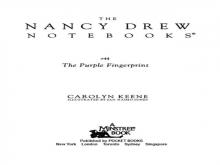 The Purple Fingerprint
The Purple Fingerprint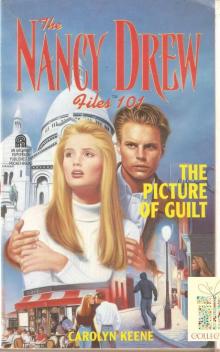 The Picture of Guilt
The Picture of Guilt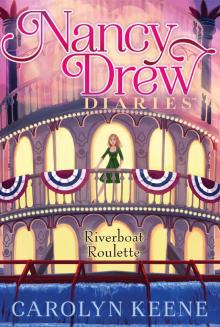 Riverboat Roulette
Riverboat Roulette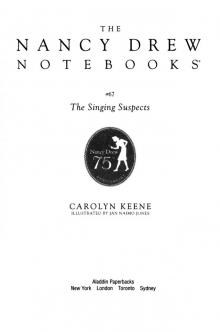 The Singing Suspects
The Singing Suspects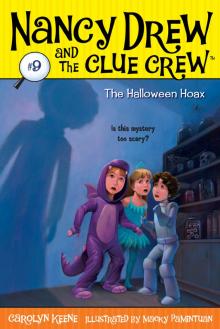 The Halloween Hoax
The Halloween Hoax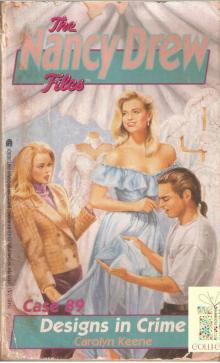 089 Designs in Crime
089 Designs in Crime The Hidden Treasures
The Hidden Treasures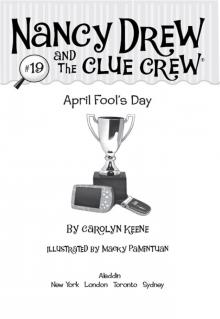 April Fool's Day
April Fool's Day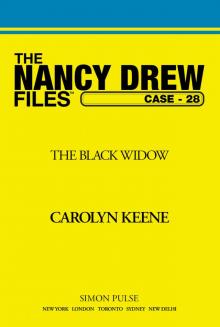 The Black Widow
The Black Widow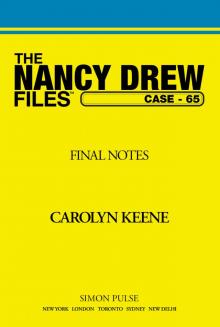 Final Notes
Final Notes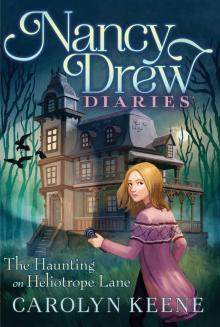 The Haunting on Heliotrope Lane
The Haunting on Heliotrope Lane The Runaway Bride
The Runaway Bride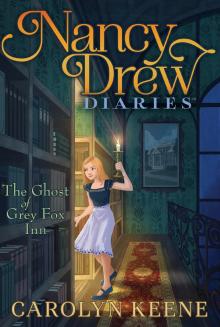 The Ghost of Grey Fox Inn
The Ghost of Grey Fox Inn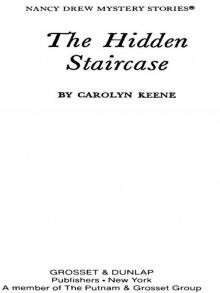 The Hidden Staircase
The Hidden Staircase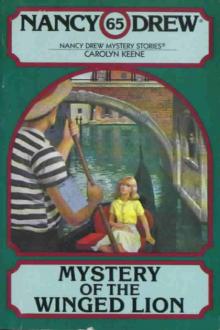 Mystery of the Winged Lion
Mystery of the Winged Lion Over the Edge
Over the Edge The Circus Scare
The Circus Scare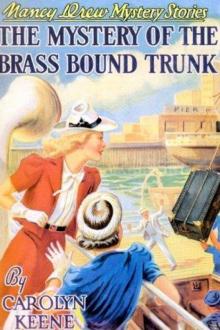 The Mystery of the Brass-Bound Trunk
The Mystery of the Brass-Bound Trunk Ski School Sneak
Ski School Sneak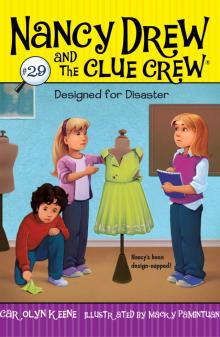 Designed for Disaster
Designed for Disaster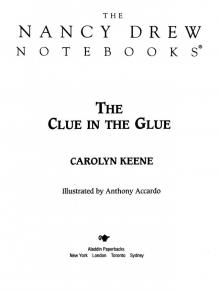 The Clue in the Glue
The Clue in the Glue Cold as Ice
Cold as Ice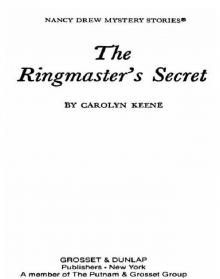 The Ringmaster's Secret
The Ringmaster's Secret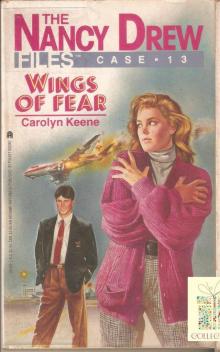 013 Wings of Fear
013 Wings of Fear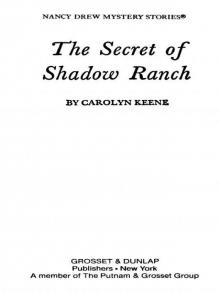 The Secret of Shadow Ranch
The Secret of Shadow Ranch Not Nice on Ice
Not Nice on Ice Earth Day Escapade
Earth Day Escapade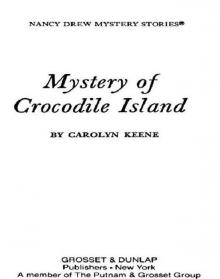 Mystery of Crocodile Island
Mystery of Crocodile Island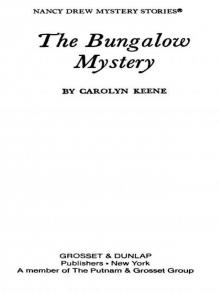 The Bungalow Mystery
The Bungalow Mystery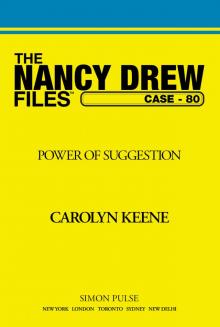 Power of Suggestion
Power of Suggestion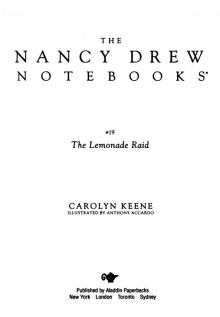 The Lemonade Raid
The Lemonade Raid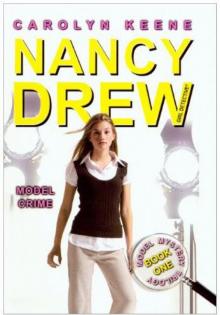 Model Crime
Model Crime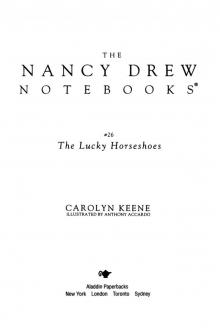 The Lucky Horseshoes
The Lucky Horseshoes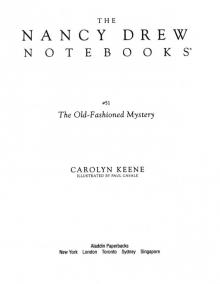 The Secret of the Old Clock
The Secret of the Old Clock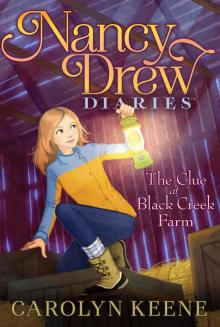 The Clue at Black Creek Farm
The Clue at Black Creek Farm Pure Poison
Pure Poison Nobody's Business
Nobody's Business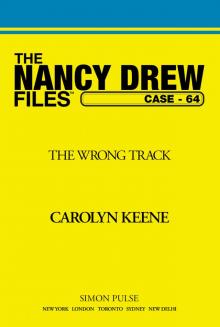 Wrong Track
Wrong Track Chick-Napped!
Chick-Napped!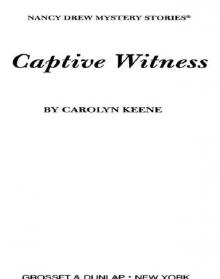 Captive Witness
Captive Witness If Looks Could Kill
If Looks Could Kill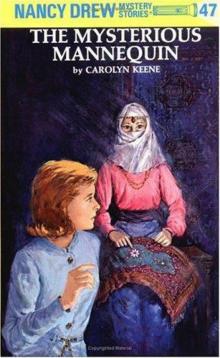 The Mysterious Mannequin
The Mysterious Mannequin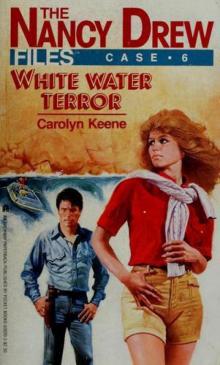 White Water Terror
White Water Terror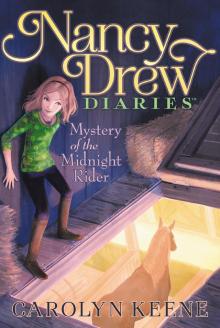 Mystery of the Midnight Rider
Mystery of the Midnight Rider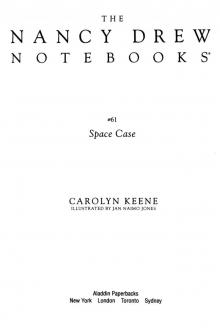 Space Case
Space Case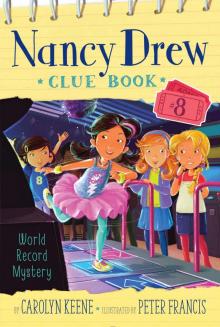 World Record Mystery
World Record Mystery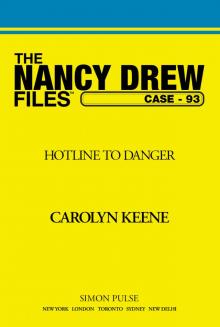 Hotline to Danger
Hotline to Danger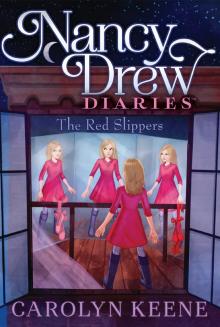 The Red Slippers
The Red Slippers A Crime for Christmas
A Crime for Christmas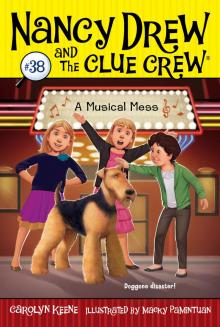 A Musical Mess
A Musical Mess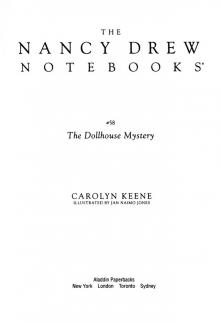 The Dollhouse Mystery
The Dollhouse Mystery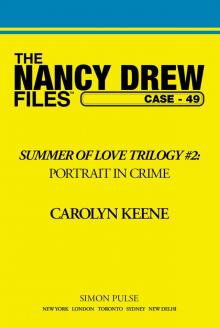 Portrait in Crime
Portrait in Crime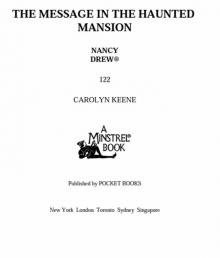 The Message in the Haunted Mansion
The Message in the Haunted Mansion Playing With Fire
Playing With Fire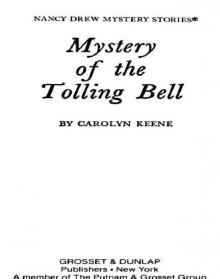 Mystery of the Tolling Bell
Mystery of the Tolling Bell Cutting Edge
Cutting Edge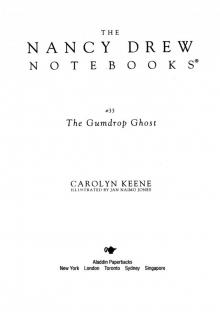 The Gumdrop Ghost
The Gumdrop Ghost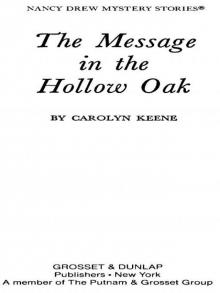 The Message in the Hollow Oak
The Message in the Hollow Oak Trial by Fire
Trial by Fire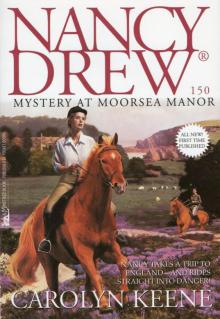 Mystery at Moorsea Manor
Mystery at Moorsea Manor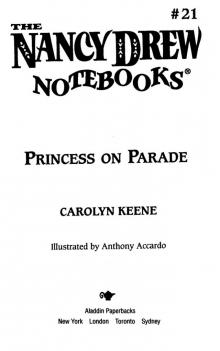 Princess on Parade
Princess on Parade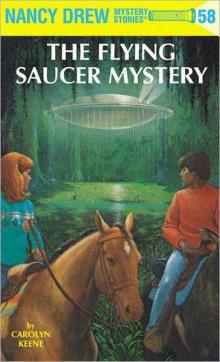 The Flying Saucer Mystery
The Flying Saucer Mystery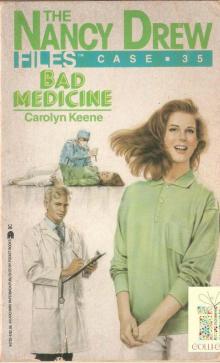 035 Bad Medicine
035 Bad Medicine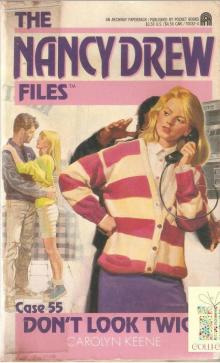 055 Don't Look Twice
055 Don't Look Twice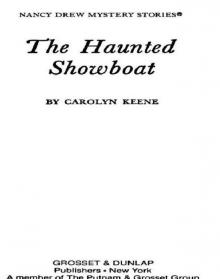 The Haunted Showboat
The Haunted Showboat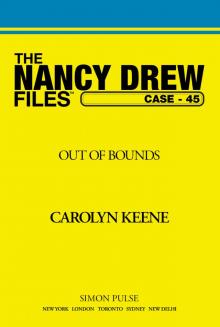 Out of Bounds
Out of Bounds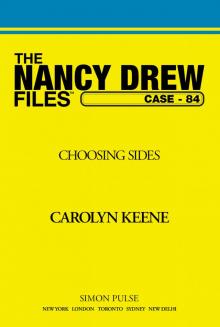 Choosing Sides
Choosing Sides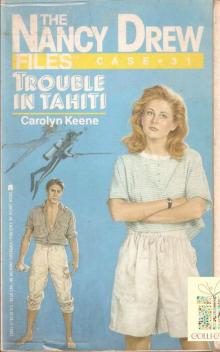 031 Trouble in Tahiti
031 Trouble in Tahiti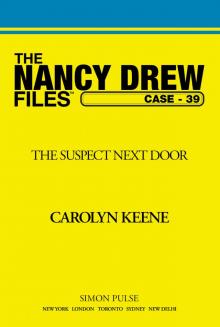 The Suspect Next Door
The Suspect Next Door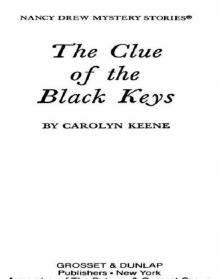 The Clue of the Black Keys
The Clue of the Black Keys The Secret Santa
The Secret Santa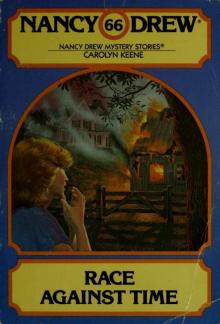 Race Against Time
Race Against Time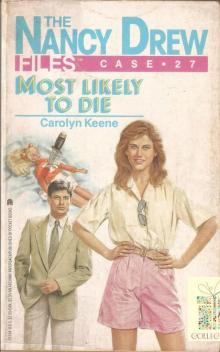 027 Most Likely to Die
027 Most Likely to Die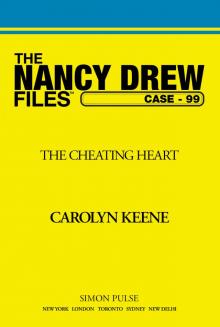 The Cheating Heart
The Cheating Heart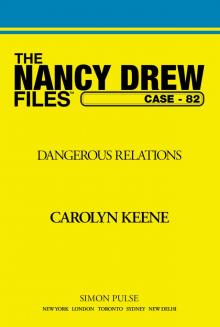 Dangerous Relations
Dangerous Relations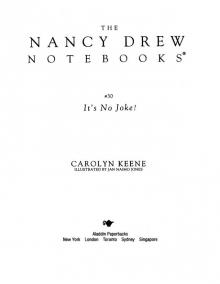 It's No Joke!
It's No Joke!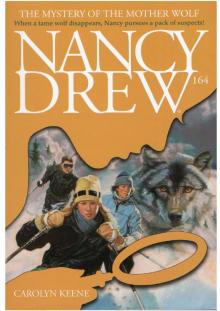 The Mystery of the Mother Wolf
The Mystery of the Mother Wolf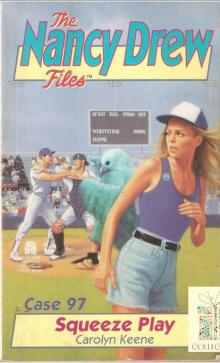 097 Squeeze Play
097 Squeeze Play Secret at Mystic Lake
Secret at Mystic Lake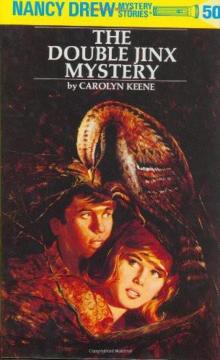 The Double Jinx Mystery
The Double Jinx Mystery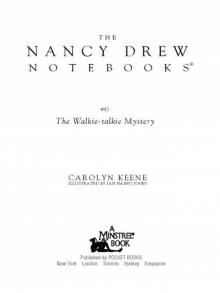 The Walkie Talkie Mystery
The Walkie Talkie Mystery The Case of the Vanishing Veil
The Case of the Vanishing Veil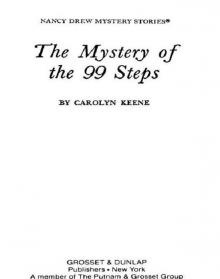 The Mystery of the 99 Steps
The Mystery of the 99 Steps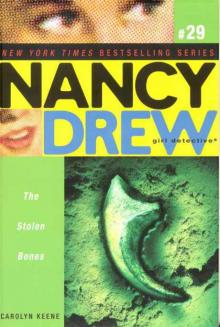 The Stolen Bones
The Stolen Bones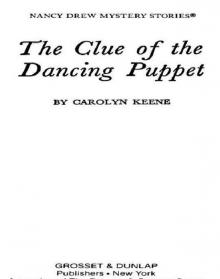 The Clue of the Dancing Puppet
The Clue of the Dancing Puppet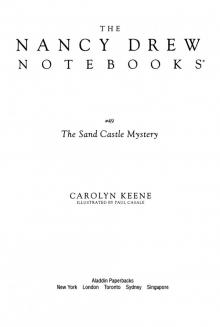 The Sand Castle Mystery
The Sand Castle Mystery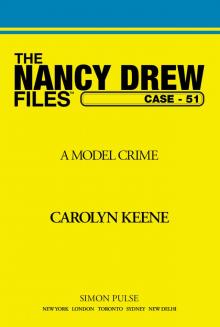 A Model Crime
A Model Crime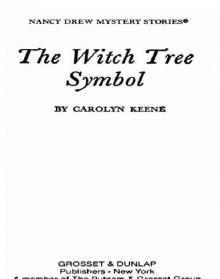 The Witch Tree Symbol
The Witch Tree Symbol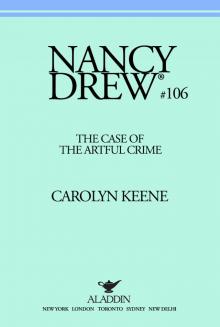 The Case of the Artful Crime
The Case of the Artful Crime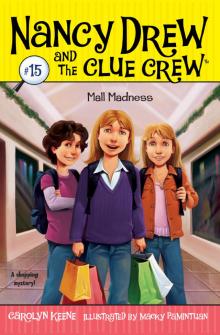 Mall Madness
Mall Madness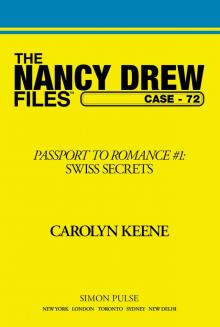 Swiss Secrets
Swiss Secrets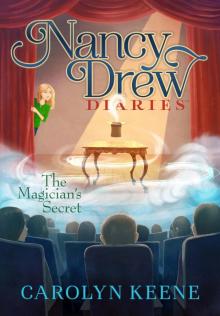 The Magician's Secret
The Magician's Secret Tall, Dark and Deadly
Tall, Dark and Deadly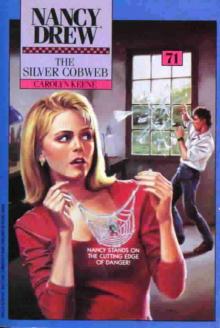 The Silver Cobweb
The Silver Cobweb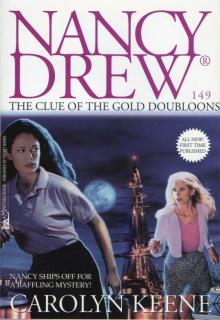 The Clue of the Gold Doubloons
The Clue of the Gold Doubloons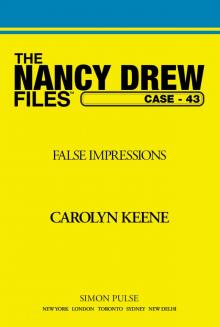 False Impressions
False Impressions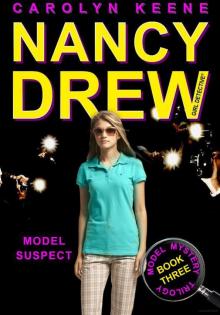 Model Suspect
Model Suspect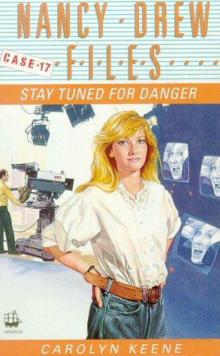 Stay Tuned for Danger
Stay Tuned for Danger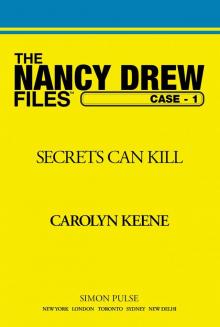 Secrets Can Kill
Secrets Can Kill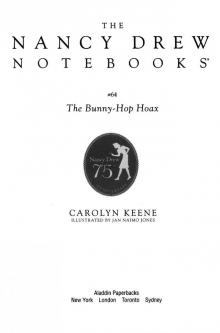 The Bunny-Hop Hoax
The Bunny-Hop Hoax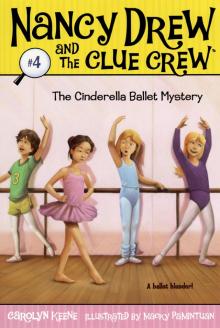 The Cinderella Ballet Mystery
The Cinderella Ballet Mystery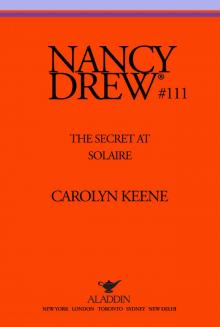 The Secret at Solaire
The Secret at Solaire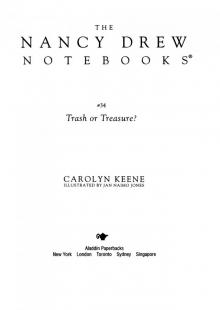 Trash or Treasure?
Trash or Treasure?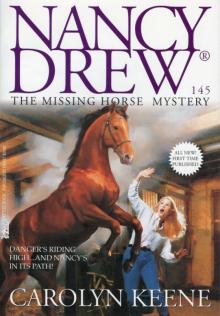 The Missing Horse Mystery
The Missing Horse Mystery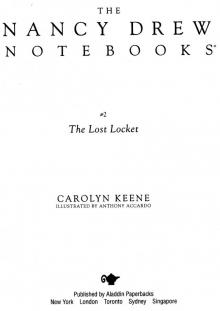 The Lost Locket
The Lost Locket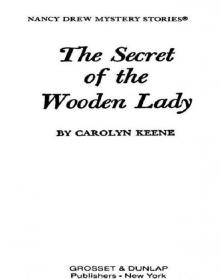 The Secret of the Wooden Lady
The Secret of the Wooden Lady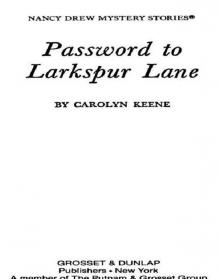 Password to Larkspur Lane
Password to Larkspur Lane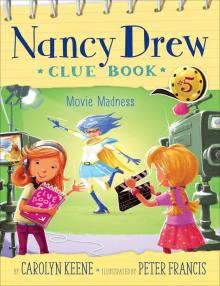 Movie Madness
Movie Madness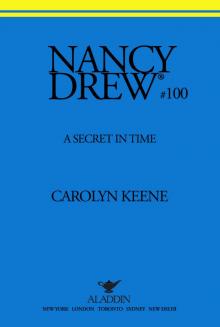 A Secret in Time
A Secret in Time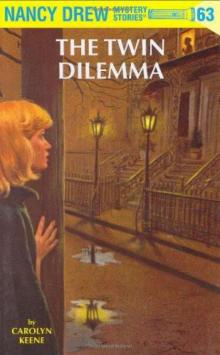 The Twin Dilemma
The Twin Dilemma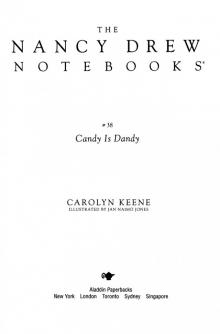 Candy Is Dandy
Candy Is Dandy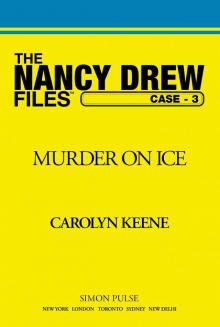 Murder on Ice
Murder on Ice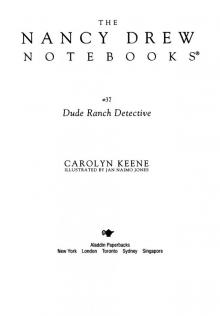 Dude Ranch Detective
Dude Ranch Detective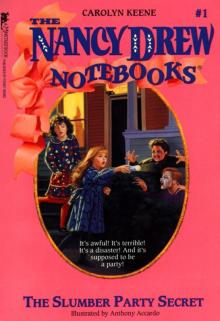 The Slumber Party Secret
The Slumber Party Secret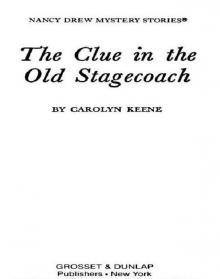 The Clue in the Old Stagecoach
The Clue in the Old Stagecoach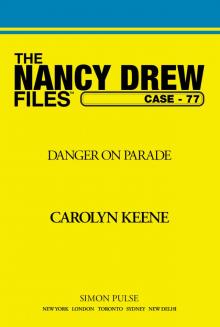 Danger on Parade
Danger on Parade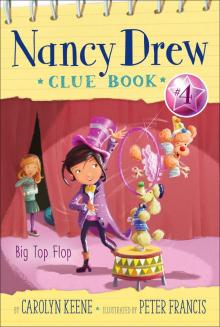 Big Top Flop
Big Top Flop Strangers on a Train
Strangers on a Train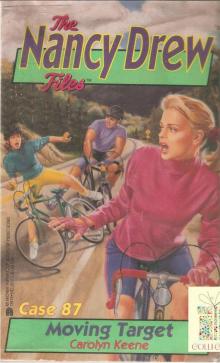 087 Moving Target
087 Moving Target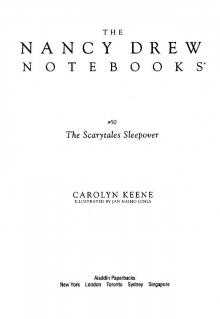 The Scarytales Sleepover
The Scarytales Sleepover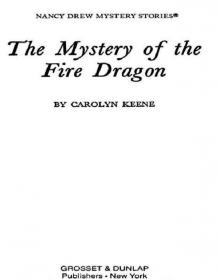 The Mystery of the Fire Dragon
The Mystery of the Fire Dragon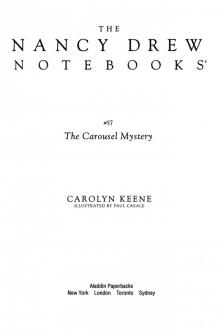 The Carousel Mystery
The Carousel Mystery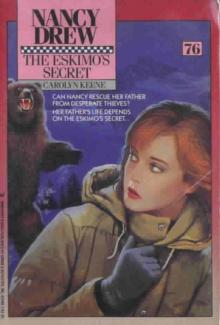 The Eskimo's Secret
The Eskimo's Secret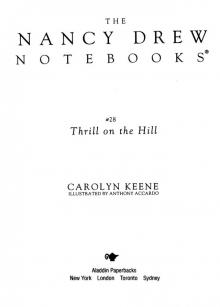 Thrill on the Hill
Thrill on the Hill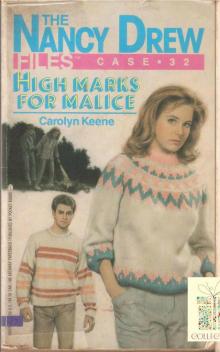 032 High Marks for Malice
032 High Marks for Malice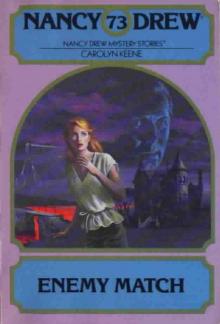 Enemy Match
Enemy Match Poison Pen
Poison Pen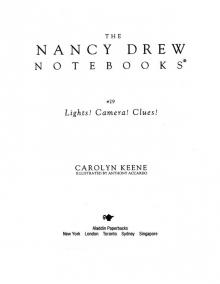 Lights, Camera . . . Cats!
Lights, Camera . . . Cats! Lost in the Everglades
Lost in the Everglades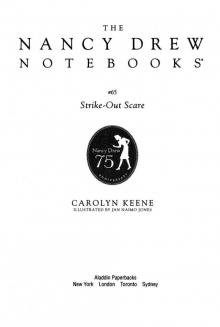 Strike-Out Scare
Strike-Out Scare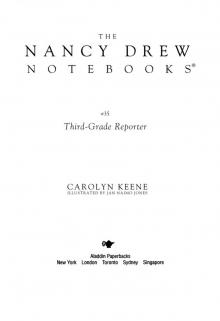 Third-Grade Reporter
Third-Grade Reporter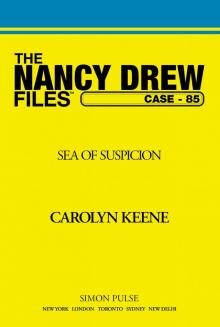 Sea of Suspicion
Sea of Suspicion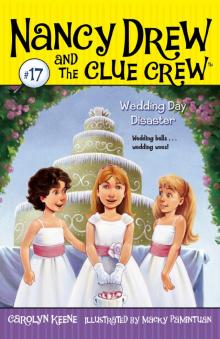 Wedding Day Disaster
Wedding Day Disaster The Make-A-Pet Mystery
The Make-A-Pet Mystery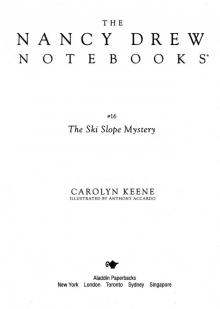 The Ski Slope Mystery
The Ski Slope Mystery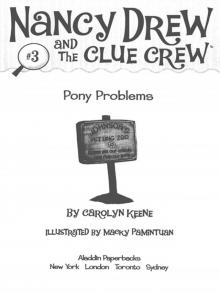 Pony Problems
Pony Problems Candy Kingdom Chaos
Candy Kingdom Chaos The Sign in the Smoke
The Sign in the Smoke The Wrong Chemistry
The Wrong Chemistry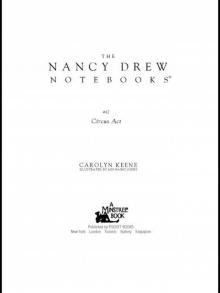 Circus Act
Circus Act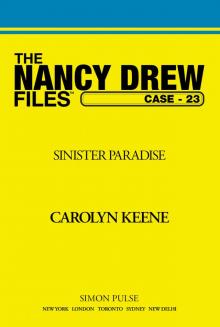 Sinister Paradise
Sinister Paradise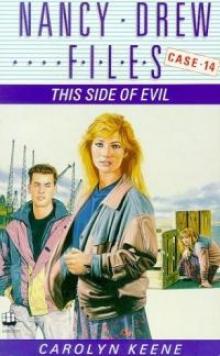 This Side of Evil
This Side of Evil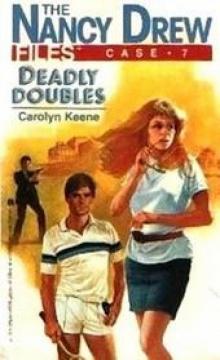 Deadly Doubles
Deadly Doubles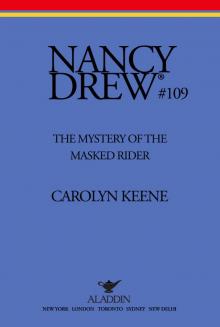 The Mystery of the Masked Rider
The Mystery of the Masked Rider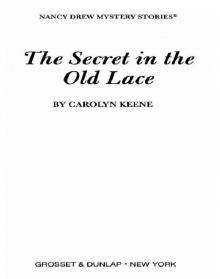 The Secret in the Old Lace
The Secret in the Old Lace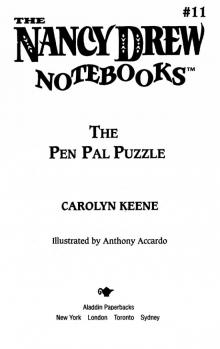 The Pen Pal Puzzle
The Pen Pal Puzzle Without a Trace
Without a Trace Whose Pet Is Best?
Whose Pet Is Best?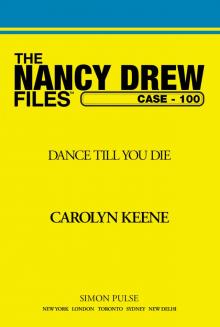 Dance Till You Die
Dance Till You Die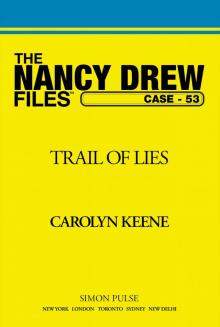 Trail of Lies
Trail of Lies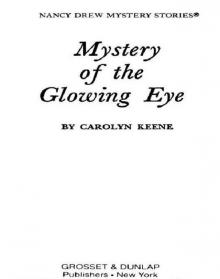 Mystery of the Glowing Eye
Mystery of the Glowing Eye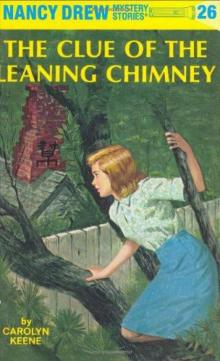 The Clue of the Leaning Chimney
The Clue of the Leaning Chimney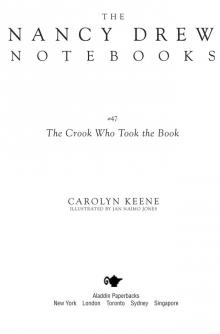 The Crook Who Took the Book
The Crook Who Took the Book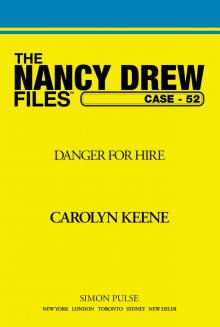 Danger for Hire
Danger for Hire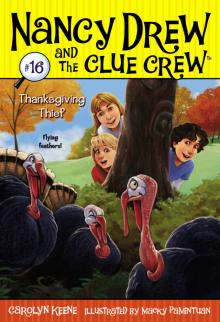 Thanksgiving Thief
Thanksgiving Thief Intruder!
Intruder!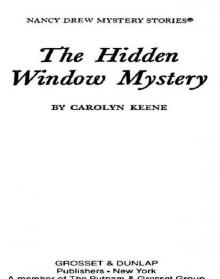 The Hidden Window Mystery
The Hidden Window Mystery Win, Place or Die
Win, Place or Die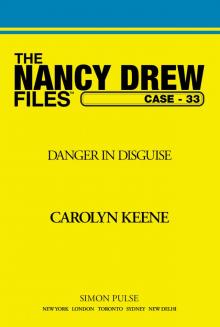 Danger in Disguise
Danger in Disguise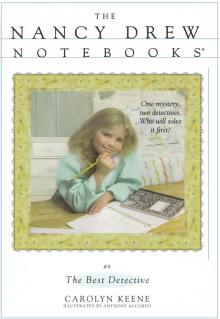 The Best Detective
The Best Detective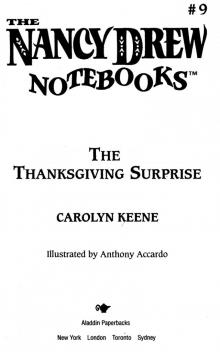 The Thanksgiving Surprise
The Thanksgiving Surprise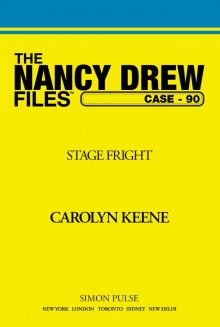 Stage Fright
Stage Fright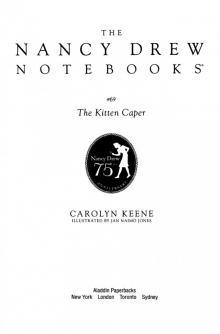 The Kitten Caper
The Kitten Caper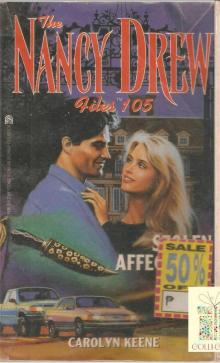 Stolen Affections
Stolen Affections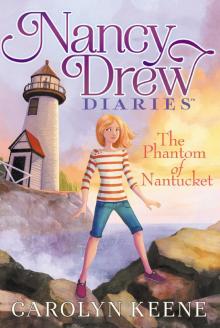 The Phantom of Nantucket
The Phantom of Nantucket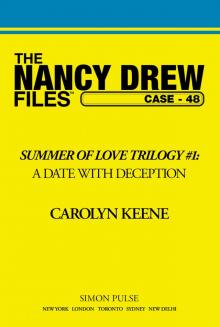 Date With Deception
Date With Deception Cooking Camp Disaster
Cooking Camp Disaster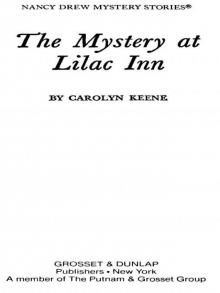 The Mystery at Lilac Inn
The Mystery at Lilac Inn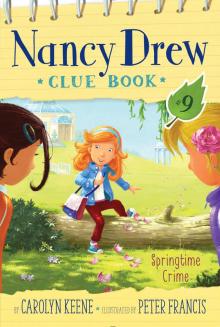 Springtime Crime
Springtime Crime Action!
Action! Into Thin Air
Into Thin Air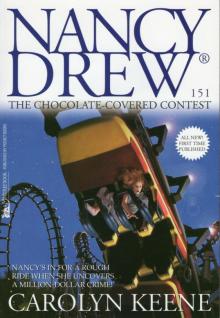 The Chocolate-Covered Contest
The Chocolate-Covered Contest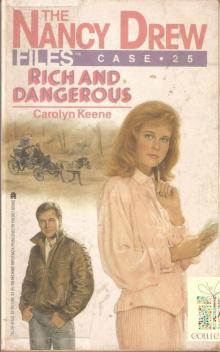 025 Rich and Dangerous
025 Rich and Dangerous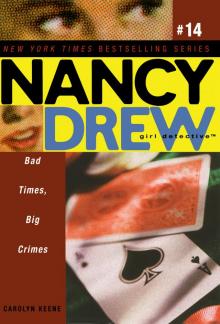 Bad Times, Big Crimes
Bad Times, Big Crimes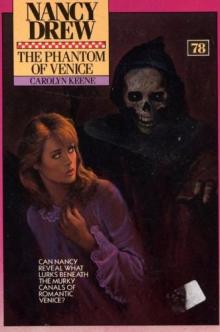 078 The Phantom Of Venice
078 The Phantom Of Venice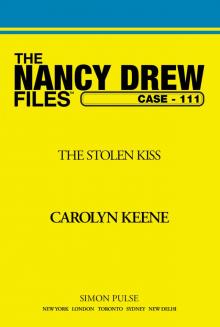 The Stolen Kiss
The Stolen Kiss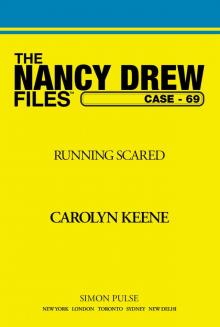 Running Scared
Running Scared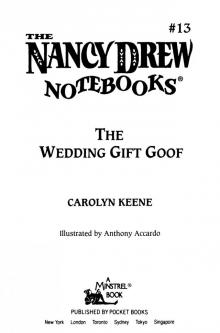 The Wedding Gift Goof
The Wedding Gift Goof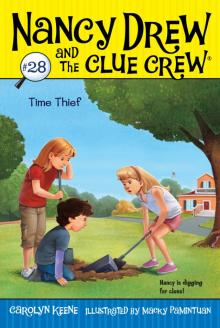 Time Thief
Time Thief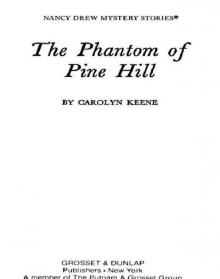 The Phantom of Pine Hill
The Phantom of Pine Hill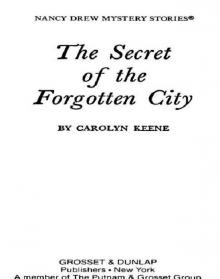 The Secret of the Forgotten City
The Secret of the Forgotten City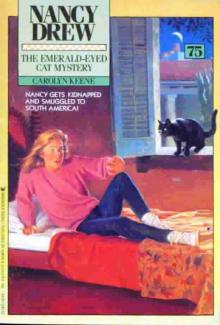 The Emerald-Eyed Cat Mystery
The Emerald-Eyed Cat Mystery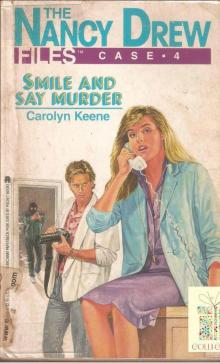 004 Smile and Say Murder
004 Smile and Say Murder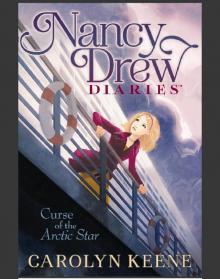 Curse of the Arctic Star
Curse of the Arctic Star Dinosaur Alert!
Dinosaur Alert!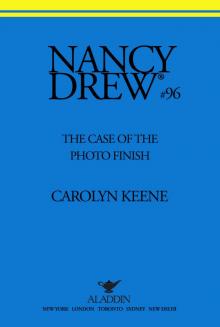 The Case of the Photo Finish
The Case of the Photo Finish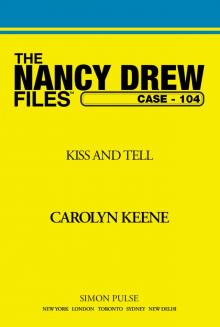 Kiss and Tell
Kiss and Tell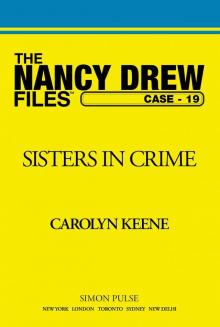 Sisters in Crime
Sisters in Crime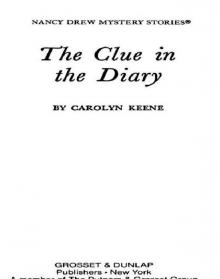 The Clue in the Diary
The Clue in the Diary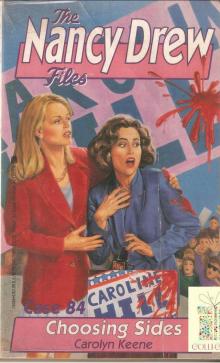 084 Choosing Sides
084 Choosing Sides Haunting of Horse Island
Haunting of Horse Island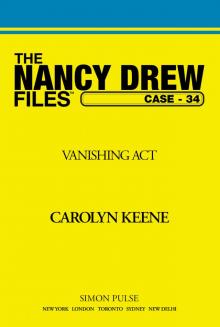 Vanishing Act
Vanishing Act The Big Island Burglary
The Big Island Burglary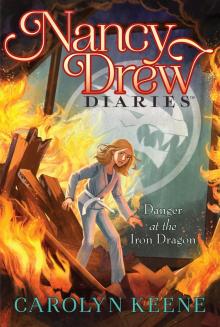 Danger at the Iron Dragon
Danger at the Iron Dragon Pets on Parade
Pets on Parade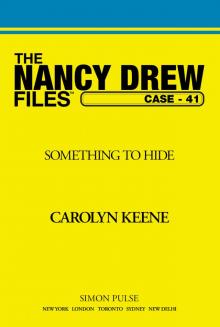 Something to Hide
Something to Hide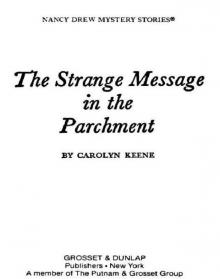 The Strange Message in the Parchment
The Strange Message in the Parchment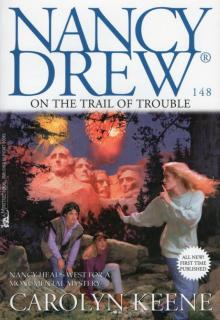 On the Trail of Trouble
On the Trail of Trouble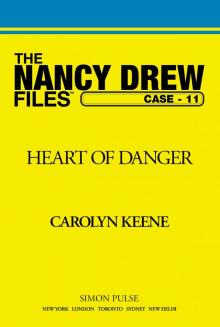 Heart of Danger
Heart of Danger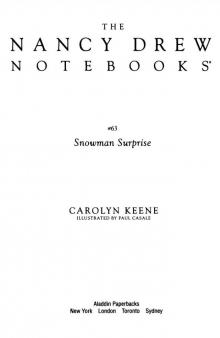 The Snowman Surprise
The Snowman Surprise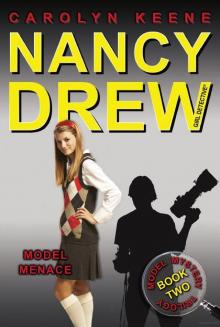 Model Menace
Model Menace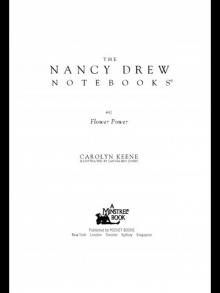 Flower Power
Flower Power The Great Goat Gaffe
The Great Goat Gaffe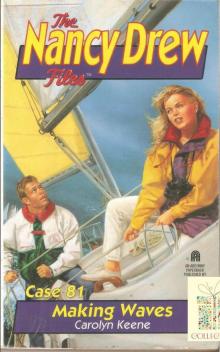 081 Making Waves
081 Making Waves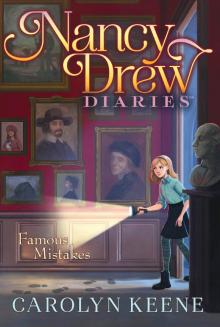 Famous Mistakes
Famous Mistakes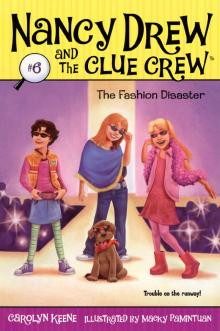 The Fashion Disaster
The Fashion Disaster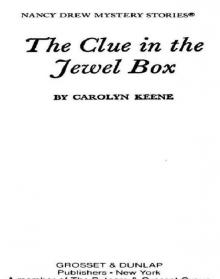 The Clue in the Jewel Box
The Clue in the Jewel Box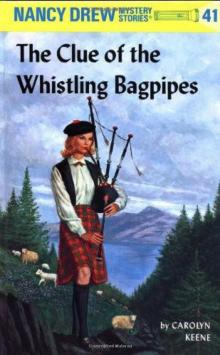 The Clue of the Whistling Bagpipes
The Clue of the Whistling Bagpipes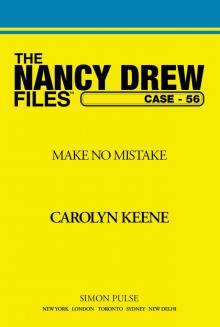 Make No Mistake
Make No Mistake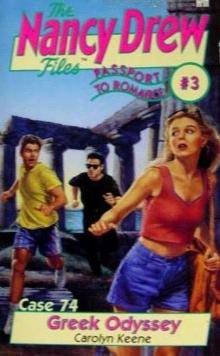 Greek Odyssey
Greek Odyssey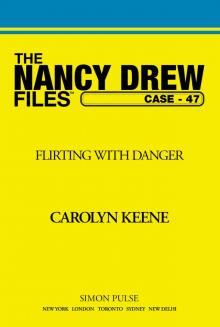 Flirting With Danger
Flirting With Danger Double Take
Double Take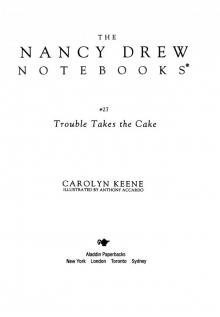 Trouble Takes the Cake
Trouble Takes the Cake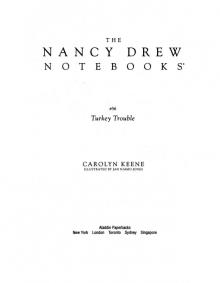 Turkey Trouble
Turkey Trouble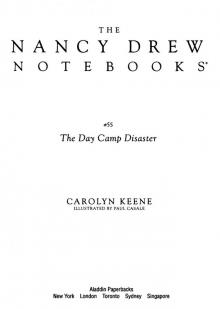 The Day Camp Disaster
The Day Camp Disaster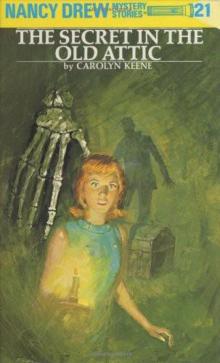 The Secret in the Old Attic
The Secret in the Old Attic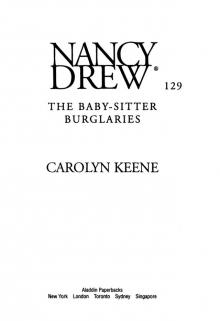 The Baby-Sitter Burglaries
The Baby-Sitter Burglaries Recipe for Murder
Recipe for Murder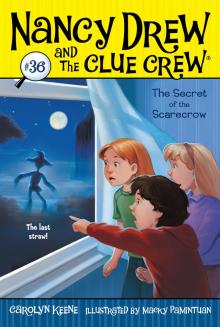 The Secret of the Scarecrow
The Secret of the Scarecrow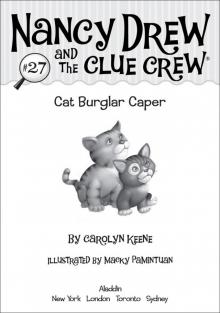 Cat Burglar Caper
Cat Burglar Caper Turkey Trot Plot
Turkey Trot Plot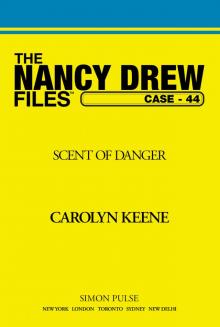 Scent of Danger
Scent of Danger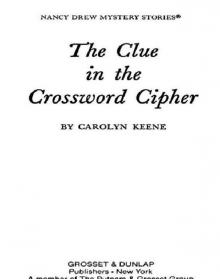 The Clue in the Crossword Cipher
The Clue in the Crossword Cipher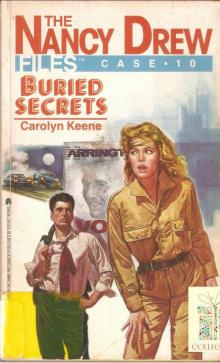 010 Buried Secrets
010 Buried Secrets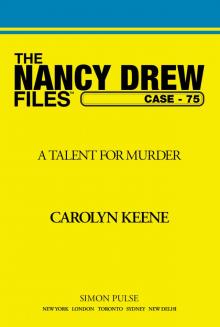 A Talent for Murder
A Talent for Murder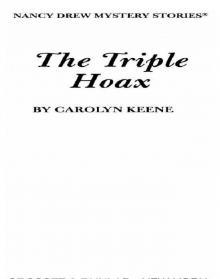 The Triple Hoax
The Triple Hoax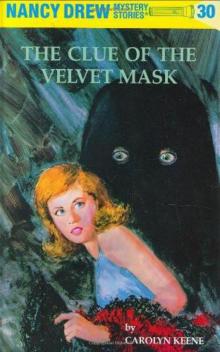 The Clue of the Velvet Mask
The Clue of the Velvet Mask Last Lemonade Standing
Last Lemonade Standing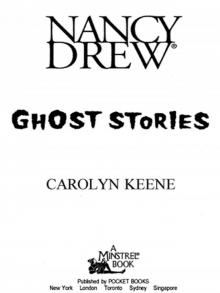 The Ghost of Blackwood Hall
The Ghost of Blackwood Hall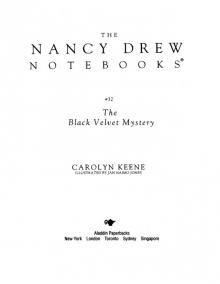 The Black Velvet Mystery
The Black Velvet Mystery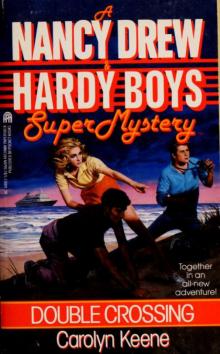 Double Crossing
Double Crossing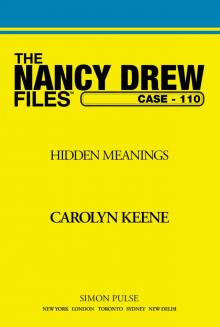 Hidden Meanings
Hidden Meanings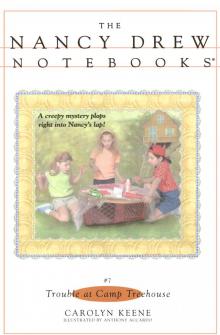 Trouble at Camp Treehouse
Trouble at Camp Treehouse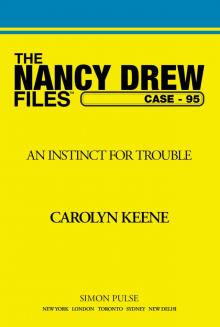 An Instinct for Trouble
An Instinct for Trouble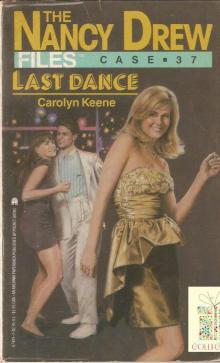 037 Last Dance
037 Last Dance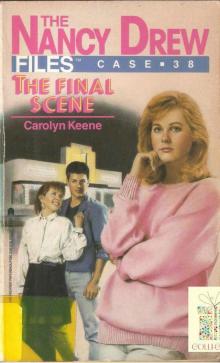 038 The Final Scene
038 The Final Scene Duck Derby Debacle
Duck Derby Debacle The Pumpkin Patch Puzzle
The Pumpkin Patch Puzzle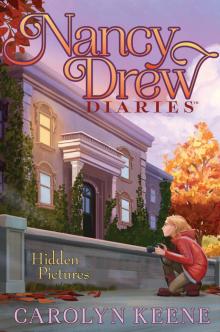 Hidden Pictures
Hidden Pictures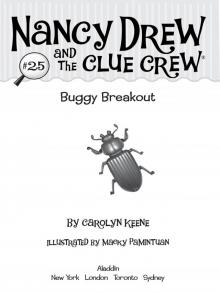 Buggy Breakout
Buggy Breakout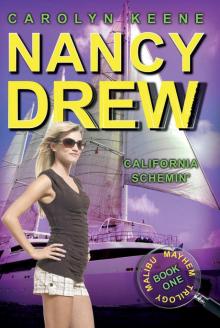 California Schemin'
California Schemin'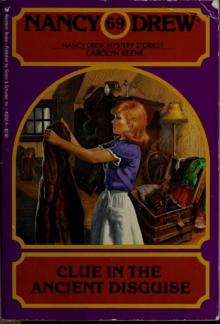 Clue in the Ancient Disguise
Clue in the Ancient Disguise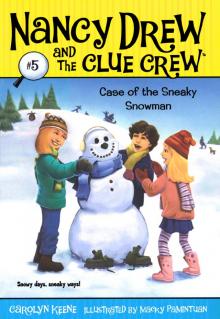 Case of the Sneaky Snowman
Case of the Sneaky Snowman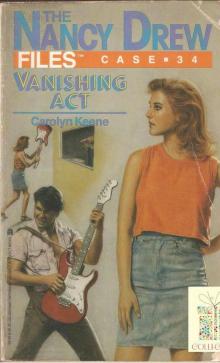 034 Vanishing Act
034 Vanishing Act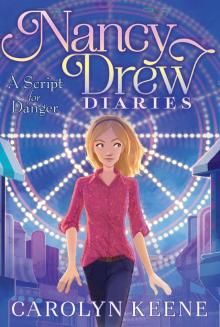 A Script for Danger
A Script for Danger The Flower Show Fiasco
The Flower Show Fiasco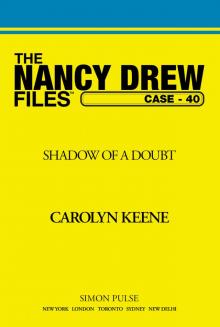 Shadow of a Doubt
Shadow of a Doubt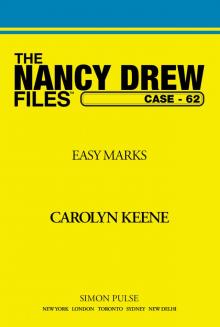 Easy Marks
Easy Marks Alien in the Classroom
Alien in the Classroom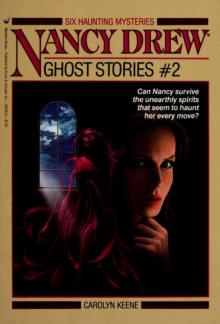 Ghost Stories, #2 (Nancy Drew)
Ghost Stories, #2 (Nancy Drew)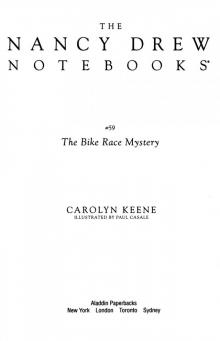 The Bike Race Mystery
The Bike Race Mystery False Pretenses
False Pretenses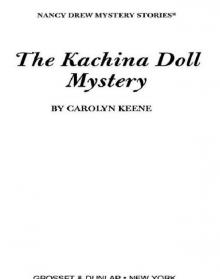 The Kachina Doll Mystery
The Kachina Doll Mystery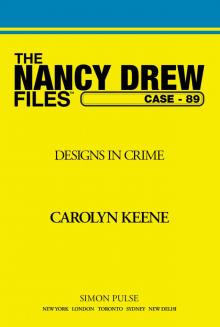 Designs in Crime
Designs in Crime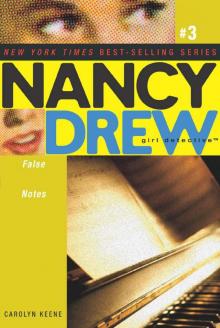 False Notes
False Notes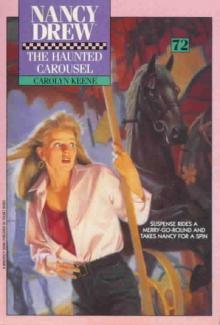 The Haunted Carousel
The Haunted Carousel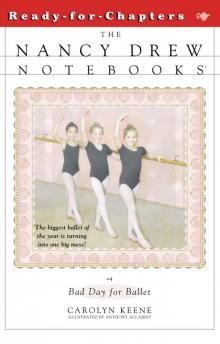 Bad Day for Ballet
Bad Day for Ballet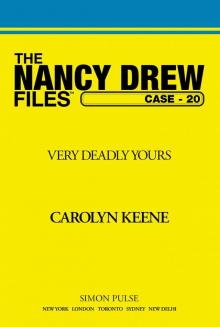 Very Deadly Yours
Very Deadly Yours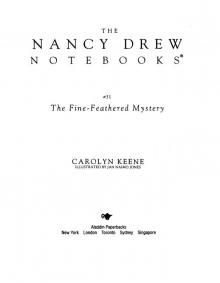 The Fine-Feathered Mystery
The Fine-Feathered Mystery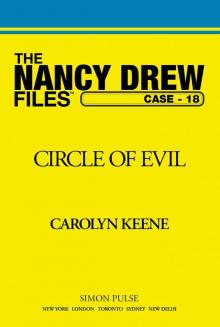 Circle of Evil
Circle of Evil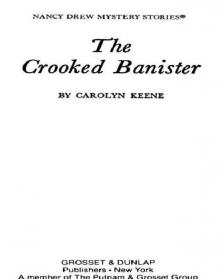 The Crooked Banister
The Crooked Banister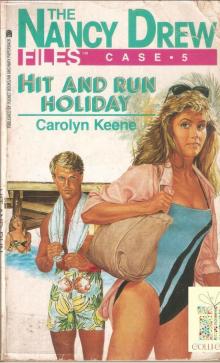 005 Hit and Run Holiday
005 Hit and Run Holiday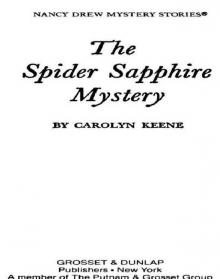 The Spider Sapphire Mystery
The Spider Sapphire Mystery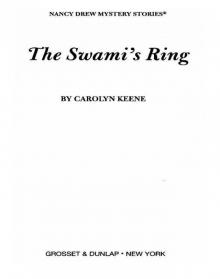 The Swami's Ring
The Swami's Ring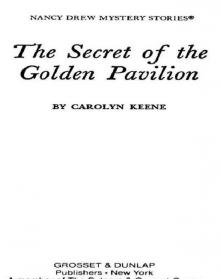 The Secret of the Golden Pavilion
The Secret of the Golden Pavilion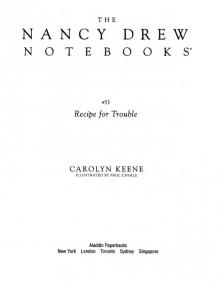 Recipe for Trouble
Recipe for Trouble Betrayed by Love
Betrayed by Love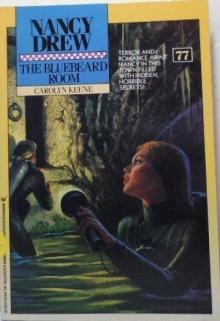 The Bluebeard Room
The Bluebeard Room Sweet Revenge
Sweet Revenge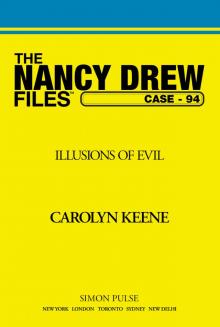 Illusions of Evil
Illusions of Evil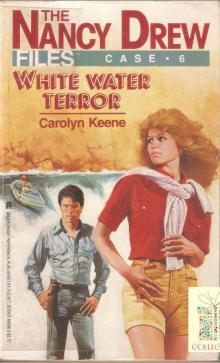 006 White Water Terror
006 White Water Terror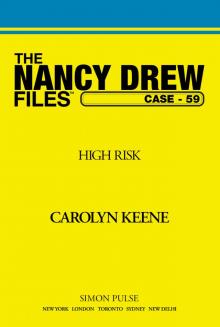 High Risk
High Risk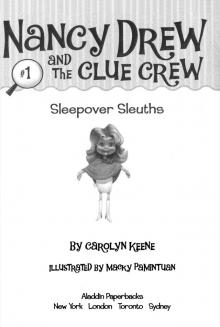 Sleepover Sleuths
Sleepover Sleuths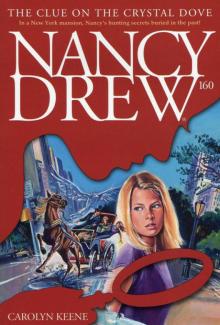 The Clue on the Crystal Dove
The Clue on the Crystal Dove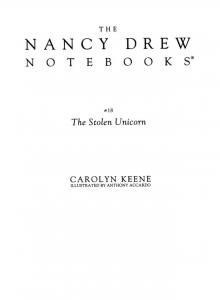 The Stolen Unicorn
The Stolen Unicorn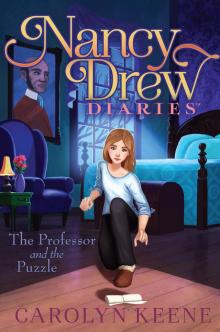 The Professor and the Puzzle
The Professor and the Puzzle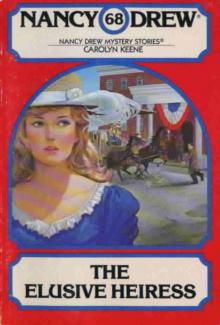 The Elusive Heiress
The Elusive Heiress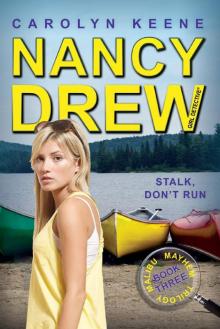 Stalk, Don't Run
Stalk, Don't Run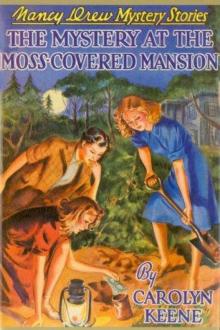 The Mystery at the Moss-Covered Mansion
The Mystery at the Moss-Covered Mansion The Tortoise and the Scare
The Tortoise and the Scare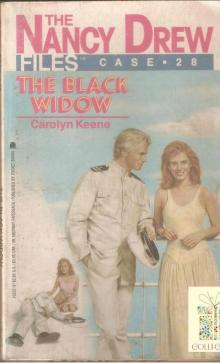 028 The Black Widow
028 The Black Widow Big Worry in Wonderland
Big Worry in Wonderland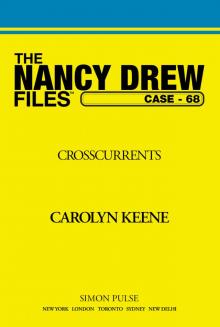 Crosscurrents
Crosscurrents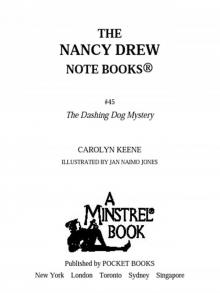 The Dashing Dog Mystery
The Dashing Dog Mystery Fatal Attraction
Fatal Attraction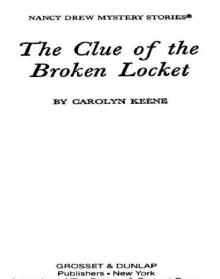 The Clue of the Broken Locket
The Clue of the Broken Locket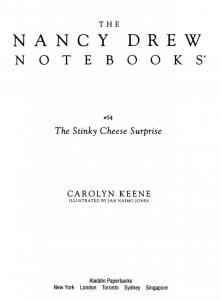 The Stinky Cheese Surprise
The Stinky Cheese Surprise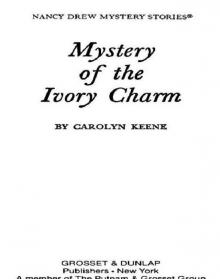 Mystery of the Ivory Charm
Mystery of the Ivory Charm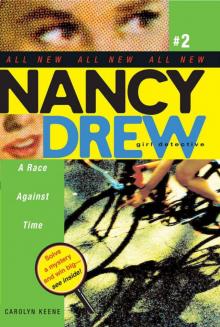 A Race Against Time
A Race Against Time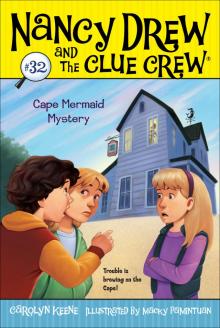 Cape Mermaid Mystery
Cape Mermaid Mystery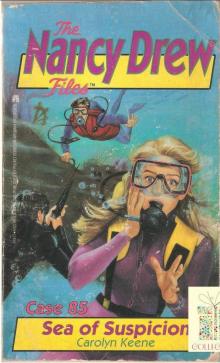 085 Sea of Suspicion
085 Sea of Suspicion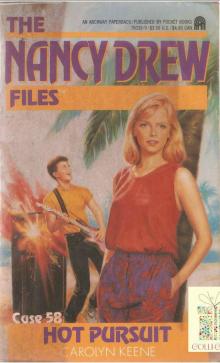 058 Hot Pursuit
058 Hot Pursuit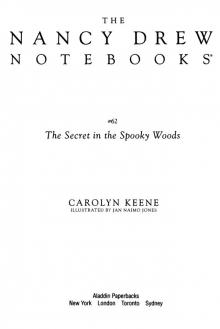 The Secret in the Spooky Woods
The Secret in the Spooky Woods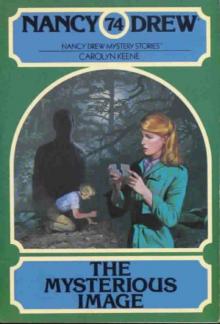 The Mysterious Image
The Mysterious Image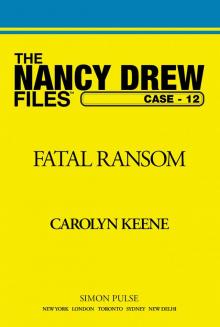 Fatal Ransom
Fatal Ransom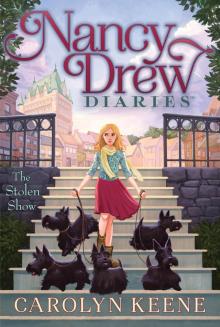 The Stolen Show
The Stolen Show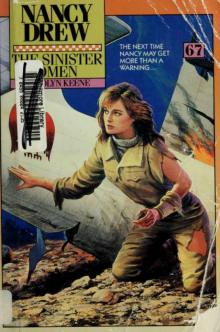 The Sinister Omen
The Sinister Omen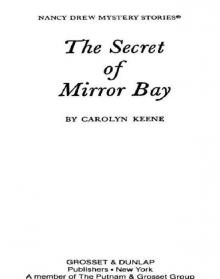 The Secret of Mirror Bay
The Secret of Mirror Bay Rendezvous in Rome
Rendezvous in Rome The Perfect Plot
The Perfect Plot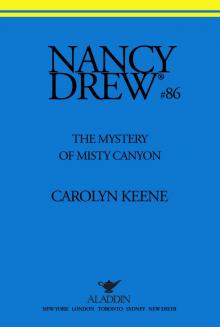 The Mystery of Misty Canyon
The Mystery of Misty Canyon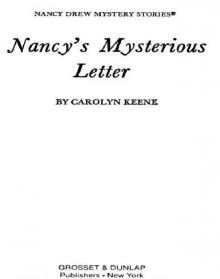 Nancy's Mysterious Letter
Nancy's Mysterious Letter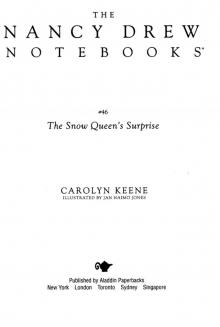 The Snow Queen's Surprise
The Snow Queen's Surprise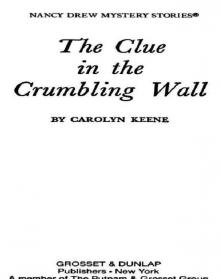 The Clue in the Crumbling Wall
The Clue in the Crumbling Wall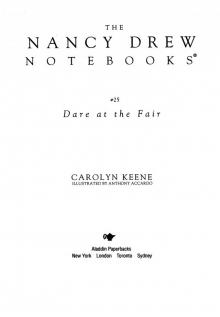 Dare at the Fair
Dare at the Fair Scream for Ice Cream
Scream for Ice Cream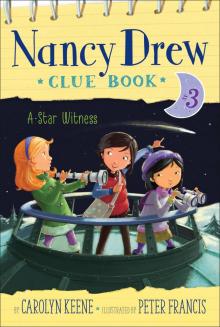 A Star Witness
A Star Witness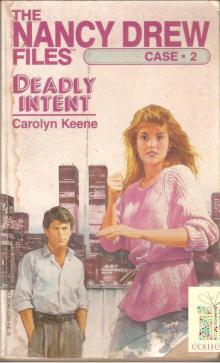 002 Deadly Intent
002 Deadly Intent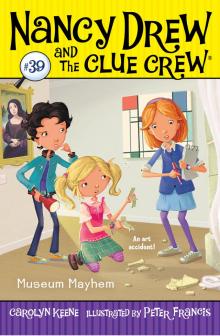 Museum Mayhem
Museum Mayhem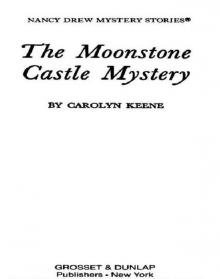 The Moonstone Castle Mystery
The Moonstone Castle Mystery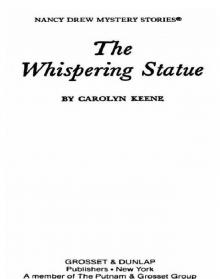 The Whispering Statue
The Whispering Statue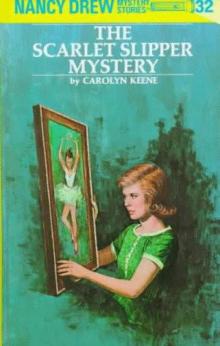 The Scarlet Slipper Mystery
The Scarlet Slipper Mystery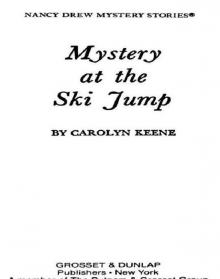 Mystery at the Ski Jump
Mystery at the Ski Jump Hot Pursuit
Hot Pursuit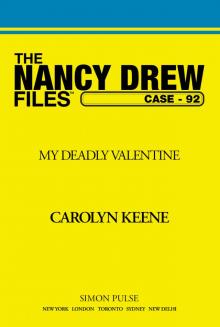 My Deadly Valentine
My Deadly Valentine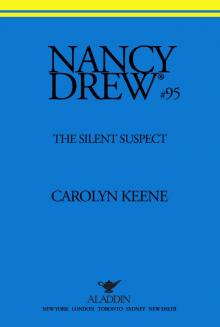 The Silent Suspect
The Silent Suspect Deep Secrets
Deep Secrets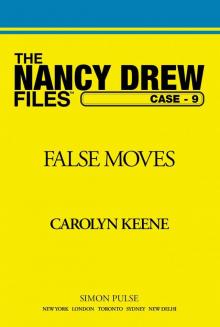 False Moves
False Moves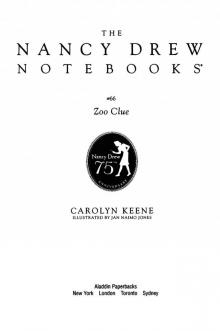 The Zoo Crew
The Zoo Crew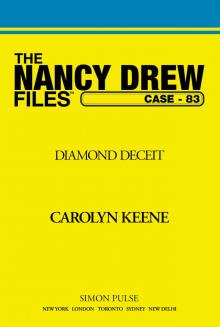 Diamond Deceit
Diamond Deceit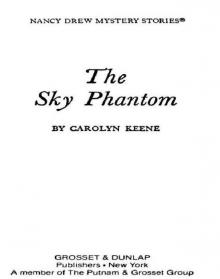 The Sky Phantom
The Sky Phantom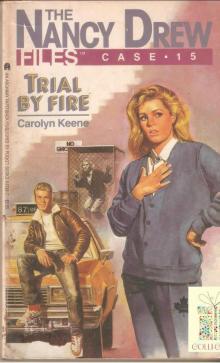 015 Trial by Fire
015 Trial by Fire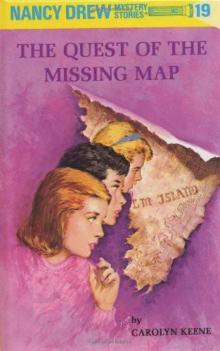 The Quest of the Missing Map
The Quest of the Missing Map Babysitting Bandit
Babysitting Bandit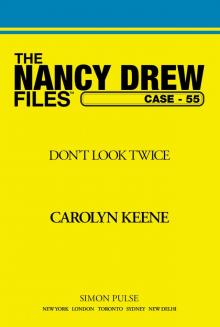 Don't Look Twice
Don't Look Twice Never Say Die
Never Say Die The Soccer Shoe Clue
The Soccer Shoe Clue Pool Party Puzzler
Pool Party Puzzler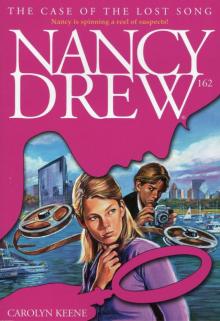 The Case of the Lost Song
The Case of the Lost Song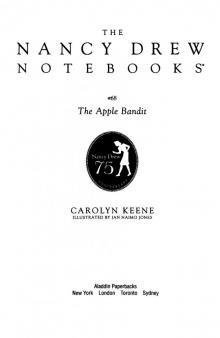 The Apple Bandit
The Apple Bandit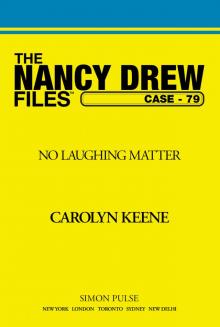 No Laughing Matter
No Laughing Matter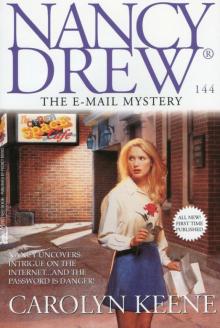 The Thirteenth Pearl
The Thirteenth Pearl Sabotage at Willow Woods
Sabotage at Willow Woods Butterfly Blues
Butterfly Blues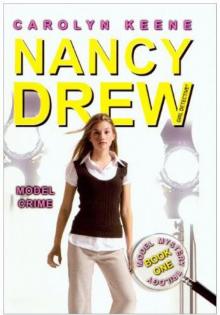 Model Crime 1
Model Crime 1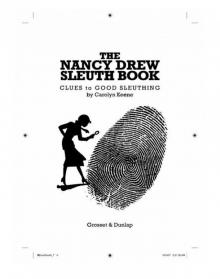 The Nancy Drew Sleuth Book
The Nancy Drew Sleuth Book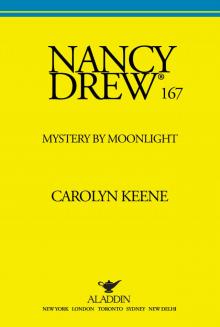 Mystery by Moonlight
Mystery by Moonlight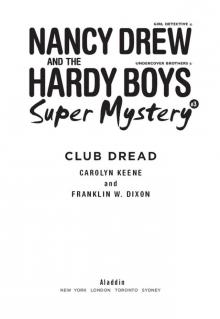 Club Dread
Club Dread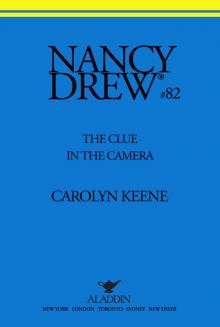 The Clue in the Camera
The Clue in the Camera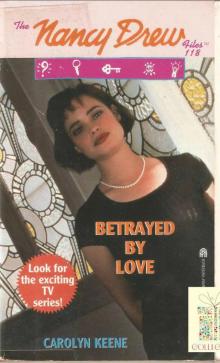 118 Betrayed By Love
118 Betrayed By Love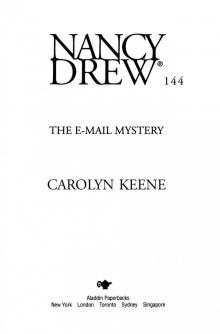 The E-Mail Mystery (Nancy Drew Book 144)
The E-Mail Mystery (Nancy Drew Book 144)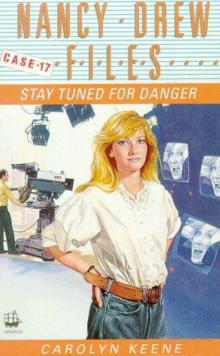 Stay Tuned for Danger: Circle of Evil
Stay Tuned for Danger: Circle of Evil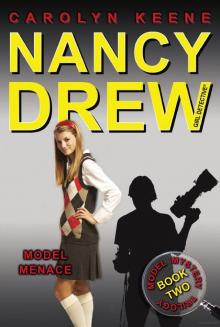 Model Menace 2
Model Menace 2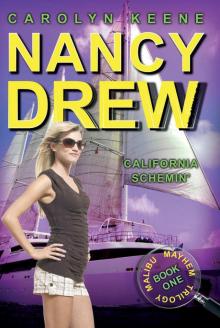 California Schemin': Book One in the Malibu Mayhem Trilogy
California Schemin': Book One in the Malibu Mayhem Trilogy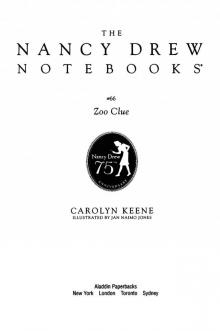 Zoo Clue (Nancy Drew Notebooks)
Zoo Clue (Nancy Drew Notebooks)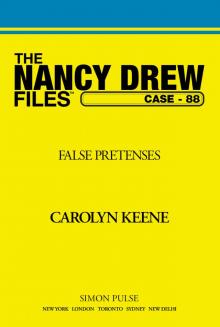 False Pretences
False Pretences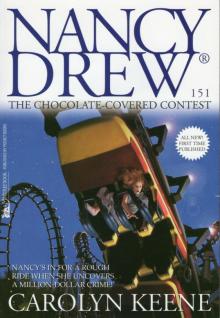 151 The Chocolate-Covered Contest
151 The Chocolate-Covered Contest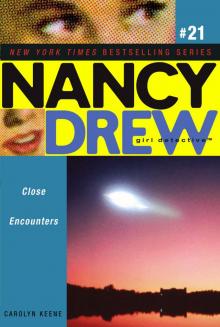 Close Encounters
Close Encounters The Emeral-Eyed Cat Mystery
The Emeral-Eyed Cat Mystery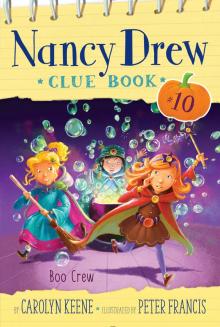 Boo Crew
Boo Crew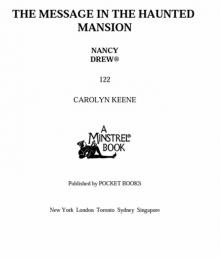 The Message in the Haunted Mansion (Nancy Drew Book 122)
The Message in the Haunted Mansion (Nancy Drew Book 122) A Nancy Drew Christmas
A Nancy Drew Christmas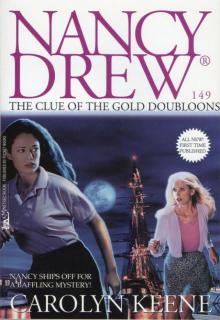 149 The Clue Of The Gold Doubloons
149 The Clue Of The Gold Doubloons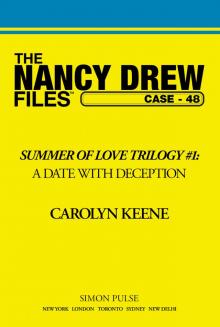 A Date with Deception
A Date with Deception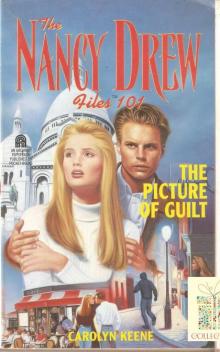 101 The Picture of Guilt
101 The Picture of Guilt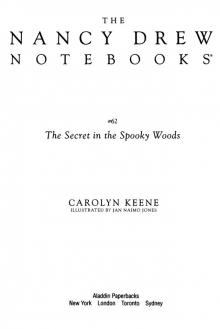 The Secret in the Spooky Woods (Nancy Drew Notebooks Book 62)
The Secret in the Spooky Woods (Nancy Drew Notebooks Book 62)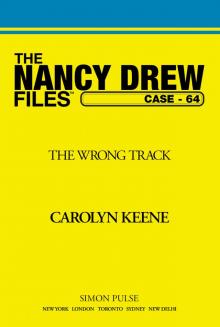 The Wrong Track
The Wrong Track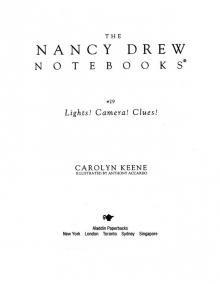 Lights! Camera! Clues!
Lights! Camera! Clues!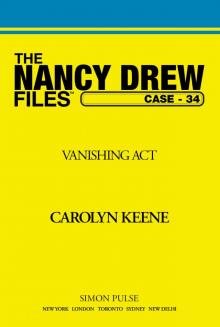 The Vanishing Act
The Vanishing Act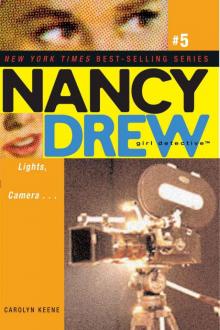 Lights, Camera . . .
Lights, Camera . . .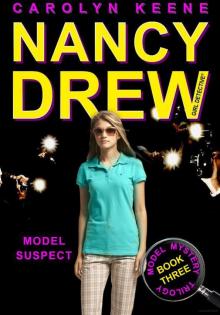 Model Suspect 3
Model Suspect 3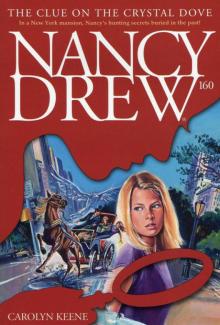 160 The Clue On The Crystal Dove
160 The Clue On The Crystal Dove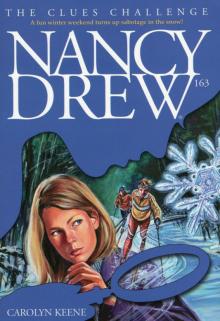 163 The Clues Challenge
163 The Clues Challenge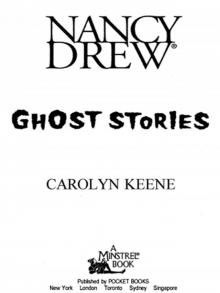 Ghost Stories (Nancy Drew)
Ghost Stories (Nancy Drew)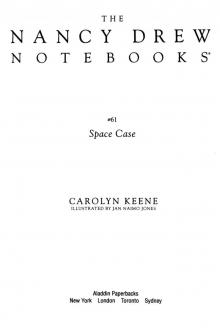 Space Case (Nancy Drew Notebooks Book 61)
Space Case (Nancy Drew Notebooks Book 61)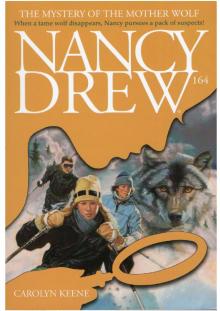 164 The Mystery Of The Mother Wolf
164 The Mystery Of The Mother Wolf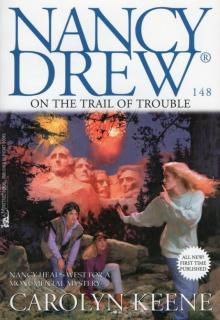 148 On The Trail Of Trouble
148 On The Trail Of Trouble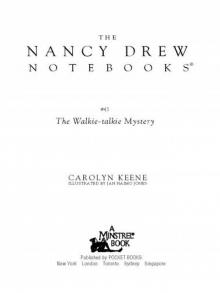 The Walkie-Talkie Mystery
The Walkie-Talkie Mystery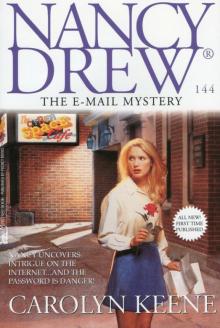 The E-Mail Mystery
The E-Mail Mystery Intruder (Nancy Drew (All New) Girl Detective)
Intruder (Nancy Drew (All New) Girl Detective)![The Stolen Relic [Nancy Drew Girl Detective 007] Read online](http://i1.bookreadfree.com/i2/04/11/the_stolen_relic_nancy_drew_girl_detective_007_preview.jpg) The Stolen Relic [Nancy Drew Girl Detective 007]
The Stolen Relic [Nancy Drew Girl Detective 007]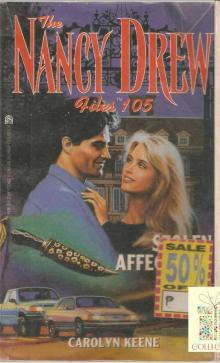 105 Stolen Affections
105 Stolen Affections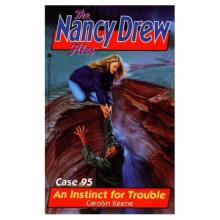 An Instict for Trouble
An Instict for Trouble 161 Lost In The Everglades
161 Lost In The Everglades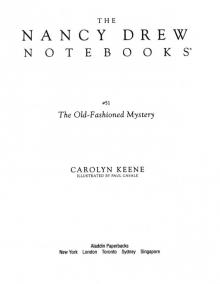 The Old-Fashioned Mystery
The Old-Fashioned Mystery Perfect Plot
Perfect Plot